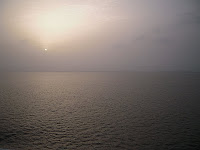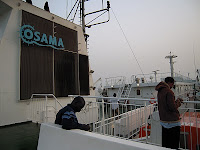


I went to Easter Mass with Martine, her god daughter, Beatrice, was receiving first communion. She is pictured to the right of her twin cousins in the first photo. In the other photo is me with Martine, her husband and Beatrice. In addition to all the children celebrating their first communion, there were dozens of families with babies to be baptized. Afterwards there was a great party. Martine had a dress made for me to wear to Mass, with a picture of Jesus, and below it said "I have faith in you" (in French of course. Except for the French priest, I was the only white person at Mass. I took the two video clips in the church in order to record the music. This was during the baptizisms. It was a very joyous occasion. The choir was terrific. In addition to the Senegalese music with traditional instruments, they performed the Easter portion of Handel's Messiah with recorded music.















